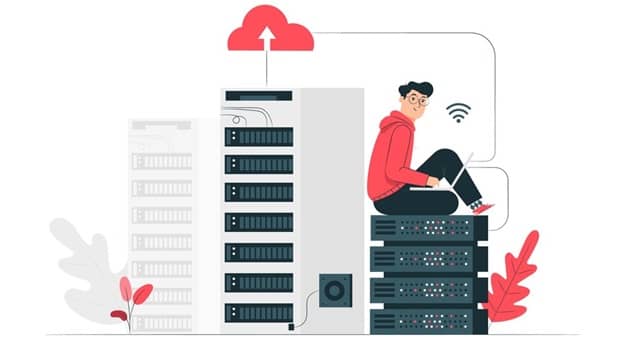When you use shared hosting, more than one website shares the same computer resources. Small and new businesses like this choice, and many people who run their eCommerce sites are considering it. Picking the correct server is very important for success. It changes how well a website works and how users feel about it and gives you information that can help you make a choice.
Understanding Shared Hosting
With shared hosting, many people put their websites on the same server. All the websites share the server’s resources, like storage space and speed. It is often less expensive to run your site this way. Shared hosting usually comes with a control panel and customer service. Users can access easy-to-use tools for managing websites.
Shared hosting is suitable for websites and apps that only get a few visitors. Many people and small businesses choose it first. Users save money because costs are lower. They don’t have to spend much money to start their online shops. This method might only work well for small sites with a few visitors. Knowing how shared hosting works will help you decide if it’s right for your needs.
Pros Of Shared Hosting For Ecommerce
1. Cost-Effectiveness
Shared hosting is cheap, which makes it an excellent choice for new businesses and companies. The costs are much lower than other hosting choices because many websites share the server’s resources. Because they are affordable, business owners can put their money toward other critical areas, like promotion and supplies, which help the business grow.
2. Ease Of Use
Shared hosting platforms usually have control screens and layouts that are easy to use. This makes it easy for people to handle their eCommerce sites, even if they are not good with computers. Many companies offer one-click installs for popular eCommerce platforms, making setting up an online store quick and easy for people who don’t know much about technology.
3. Technical Support
Most shared hosting companies offer customer service 24 hours a day, seven days a week. This help is very helpful for people who don’t know how to run a website or have computer problems.
Having access to reliable help ensures that issues can be fixed quickly, reducing downtime and improving the overall shopping experience on eCommerce sites.
4. Managed Services
Many shared hosting plans come with controlled services that make running a website easier. Users can have software changes, security checks, and backups done automatically, so they don’t have to do these things themselves. Because of this, business owners can focus on building their eCommerce operations instead of keeping up with technical issues.
5. Quick Setup
With shared hosting, setting up a website is usually quick and easy. Most companies let users set up different eCommerce sites with just one click so they can start selling online immediately. Entrepreneurs who want to start selling and making money as soon as possible will benefit from this quick setup process.
Cons Of Shared Hosting For Ecommerce
1. Limited Resources
With shared hosting, each website on the computer can only use a certain amount of resources. When several sites share data and files, it can slow things down, especially when there are a lot of visitors at once. This limitation can cause pages to load slowly, ruining the user experience and making people not want to buy from your eCommerce shop.
2. Security Risks

Shared server settings come with security risks. Multiple websites are stored on the same computer, so a security hole in one can make other websites less safe. Because of this shared risk, eCommerce sites are more likely to be hacked, have their data stolen, or face other security problems that put private customer data at risk.
3. Performance Issues
Performance can change a lot with shared hosting because computer resources are shared. As more people visit one site, it can make all the other sites on the same computer take longer to load. Customers may get angry and leave their shopping carts, hurting sales and general customer happiness.
4. Scalability Challenges
When your eCommerce business grows, shared hosting can make it harder to add more space. When you need to upgrade because of more traffic or resources, you usually have to switch to a different type of service. This switch could be hard and take a long time, which could slow down your website during the process.
5. Lack Of Control
When users use shared hosting, they don’t have full power over the server settings and setups. This lack of power can be limiting, especially for companies that need to meet certain technology standards. Some customizations might not be possible or might be limited, which would stop eCommerce sites from improving speed or adding needed features.
Alternatives To Shared Hosting For Ecommerce
1. VPS Hosting
Virtual Private Server (VPS) hosting gives each website its own tools, making it run faster and more reliably. When set up, VPS hosting gives you more power over the server, so you can make changes as needed. This makes it an excellent choice for eCommerce sites that are growing and need to be more reliable, have better security, and be able to handle more traffic.
2. Cloud Hosting
Cloud hosting uses multiple computers to spread resources and ensure the service is always available. It is scalable, meaning businesses can add or remove aids based on demand. This adaptability is great for eCommerce sites whose traffic fluctuates since cloud hosting helps keep the site running smoothly during busy times.
3. Dedicated Hosting
With dedicated hosting, your eCommerce site has its computer, giving you more power and better speed. It eliminates problems with sharing resources, which speeds up load times and improves protection. This choice is better for big online stores that need a lot of traffic and resources but cost more than shared or VPS hosting.
4. Managed WordPress Hosting
Managed WordPress hosting is designed for online shops that use WordPress as their base. It provides better computer settings for control, speed, and security. Managed hosting comes with backups, automatic changes, and expert help, so it’s suitable for businesses that want an easy hosting option that doesn’t require technical upkeep.
5. WooCommerce Hosting
Hosting for WooCommerce shops is designed for stores using the WooCommerce platform. It creates a better setting so that pages run faster, are safer, and have better support. This service works well with WooCommerce features and apps, so it’s a good choice for store owners who only use WooCommerce.
Conclusion
Shared servers for eCommerce have pros and cons. They give companies options that don’t cost a lot of money. Benefits like being easy to use and having expert help are great. However, resource limits, security risks, and problems with scaling can be big problems.
Entrepreneurs need to think carefully about what their business needs. Check how much traffic and growth you expect. Look at speed data and essential features. It’s also wise to look into alternatives to shared hosting. This gives your online store the best chance of being successful.
